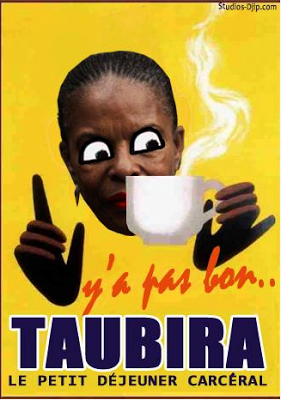Racial Politics in France
November 22, 2013
THE FRENCH are now subject to the same relentless scolding by successful blacks — the very people they have elevated to positions of stature — that Americans have been experiencing for many years. See Tiberge’s latest report at Galliawatch.
— Comments —
James N. writes:
Although I am a fluent French speaker, I grant that fluency does not always equal comprehension. In particular, perhaps the French words “liberté” and “égalité” do not exactly reproduce the meanings of our “liberty” and “equality.” That said, as political terms, “liberty” and “equality” are antonyms. Where liberty in the American sense exists, there cannot be equality, and the imposition of equality by the State must perforce extinguish liberty.
I would be very interested if Tiberge or another equally well-informed French speaker could comment.
Tiberge writes:
As for “liberté,” I refer you to Lawrence Auster who differentiated between liberty and freedom. The French do not have two words, so they must use “liberté.” Therefore they use it mostly in the political sense as Lawrence describes here and here.
When they want to emphasize “freedom to do anything” they might use an expression: “être libre de…”
For example: “Je suis libre de faire ce que je veux”, rather than “J’ai la liberté de faire ce que je veux,” although it isn’t wrong.
So I think “liberté” and “liberty” are similar, but in France the word replaces two English words. “Freedom of speech” is “liberté d’expression.”
See this page.
As for “égalité,” I don’t know if there is a difference. We have turned “equality” into a weapon for destroying quality. The same has happened in France. In both countries the word has been stretched beyond its natural limits and has become harmful to the survival of Western civilization. James N. is quite right. Long ago, in 1970, I was taking a history course at the University of Paris. The professor, a Communist, was excellent, strange as it may seem, and he handled foreign students very well. He explained that “égalité” ruled out “liberté” and vice versa. And as for “fraternité,” he felt it didn’t have much of a chance …
“Equality” has various meanings (not only in France), ranging from “formal equality” to “substantive (or real) equality”. “Formal equality” stipulates that the same laws and rules should apply to all people whatever their race, gender, religion or wealth. Libertarians, for example, advocate this kind of equality. “Substantive equality” aims at compensating what is seen as initial disparities. Its advocates argue that because of his race, gender, or social origin an individual can have fewer opportunities than others, even if formal equality is guaranteed. According to the supporters of “substantive equality”, such a person should be helped with subventions or affirmative action. This conception of equality is common among the left.
James N. is right. The meaning of “equality” is not the same in France. I think that we lean more toward “substantive equality” than Americans do.
He is right again when he write that “liberty in the American sense” cannot coexist with the enforcement of “real equality” by the state. Does that mean that the motto of the French Republic, “liberté, égalité, fraternité”, is nonsense? Well it depends, because “liberty” can be understood in various ways too. As Tiberge explained, in French both “liberty” and “freedom” translate as “liberté”. That’s why in the following I mix the two words. Leftists argue that freedom/liberty requires that one can choose his career or where he spends his vacations, for example. Then they point out that a poor individual cannot do so, because he cannot afford college or buy an airline ticket. And they conclude that poor people are not free, and that freedom/liberty is yet to be achieved. That’s why, in their mind, liberty needs equality (in its “substantive” version) as a prerequisite. It is possible that the previous reasoning is more common among French leftists for the reasons Tiberge has pointed out.

